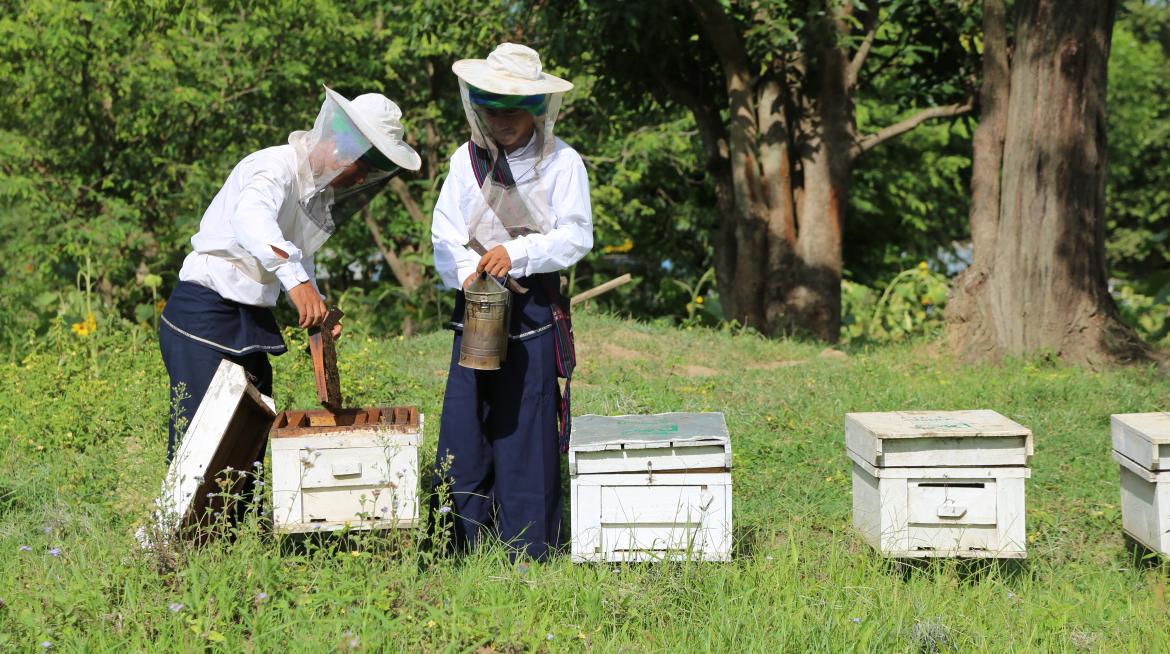
With bee numbers in decline globally, Myanmar is one of a handful of locations which holds hope for an expansion of bee keeping activities, including important pollination services to increase crop yields. However, the growing and unchecked use of chemical pesticides threatens the very existence of bees. Policy on chemical pesticide and fertiliser use needs to be put in place, and the public needs to become aware of the dangers.
These messages were shared last month at the Plan Bee Policy Implications Seminar in Nay Pyi Taw held by partner TAG International. Local and international experts attended the event and presented their findings on the bee situation in Myanmar, and globally.
U Myint Than from Apiculture Resources and Business Centre gave a brief history of TAG. In 2012, TAG with MASHAV (Israel's Agency for International Development Cooperation) contacted the Myanmar government and explained their intention to train the rural population in modern beekeeping techniques. The government agreed and, with funding from LIFT, TAG and its partners started the Plan Bee project in 2013.
Myanmar has 893 registered commercial beekeepers, who produce around 4,500 metric tons of honey a year. With economic sanctions on Myanmar, only 3,500 tons are exported, to within the region. U Myint Than thinks there is potential for increasing the present status of beekeeping. "People are increasing their capacity for beekeeping so as to increase the number of colonies," he said. “Based on the present situation and trend, the production of Myanmar honey can double within a decade. Myanmar beekeepers are looking forward to exporting to the world market.”
Dr Dinh Quyet Tam of Vietnam Beekeepers Association focused on the importance of the honeybee as a pollinator. Bees help bring in revenue of 117 billion USD per year worldwide and spur job creations, income-generation and reducing poverty in developing countries. Dr Tam stressed that they “must be protected from things which can be controlled,” such as making the habitat safe for bees, with availability of forage, suitable agricultural systems and vegetation, and minimise the use of pesticides/fungicides/herbicides which are harmful to bees.
The government has an essential role to set and implement these regulations, said Dr Tam.
Nguyen Truong Vuong from the corporate social responsibility arm of Syngenta, the global Swiss agribusiness that produces agrochemicals, research and seeds, reiterated the importance of bees: 87% of crop species require insect pollination – of this 80% from bees. Neonicotinoid pesticide (NNI) is considered to permanently stop pest insects from being able to feed and can harm bees if not used properly. Vuong advocated that farmers should get to know their local beekeepers, where the hives are located, learn how bees benefit their crop, learn when bees are foraging, and crucially, should not spray where bees are present.
TAG went into further detail about the major challenges which are facing honeybees and therefore beekeepers. In addition to the increase in harmful pesticides, beekeepers face a reduction in bee-friendly crops, a lack of domestic market for beekeeping products, and limited access to international market.
TAG maintained that working together is the way to face these challenges. TAG emphasises that “farmers need pollination, beekeepers need pollinating crops, consumers need honey, honey producers and sellers need government for accreditation, beekeepers need NGOs for capacity building, both beekeepers and farmers need the government to promote pollination, the commercial sector can benefit from investing in beekeeping, and suppliers of agri inputs need to ensure proper training so as not to harm bees.” It’s a chain reaction.
All speakers agreed that more research and raising awareness in communities should be done for the bees. This can be through education, multimedia and seminars. Training courses, funding, cooperative associations, promotion of trade and marketing, and credit for beekeepers is also needed to help Myanmar reach its bee produce potential.
Seminars like these help to kick-start actions that need to be taken.
Please see the speakers’ presentations below:
Ko Aung Kyaw Kyaw - LIFT Village Organisation Study
Dr Tam - Climate Change and Beekeeping
Dr Tam - Challenges of Introducing Modern Beekeeping Equipment
TAG - Plan Bee Policy Implications Seminar
Nguyen Truong Vuong - Pollinator Stewardship Presentation
U Aung Baw - Integration of Beekeeping and Agriculture
U Myint Than - Challenges of Exporting Honey from Myanmar


